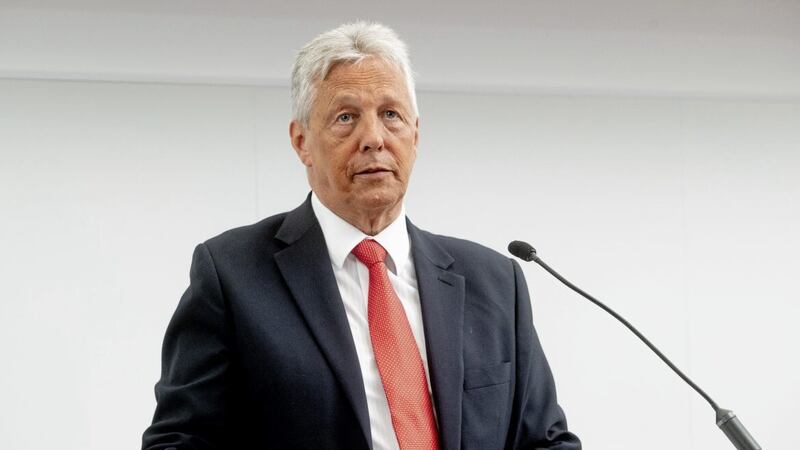The DUP’s panel to consider the Windsor Framework is a classic Peter Robinson ‘clever device’. The former DUP leader will be one of its eight members, presumably to keep an eye on the controls. Overall, the panel’s moderate composition – by DUP standards – indicates approval will be forthcoming. The question is how long this will take.
The panel is to report by the end of March, seven weeks before May’s council election. Restoring Stormont in that time-frame looks tight and restoring it for the April 10 anniversary of the Good Friday Agreement looks impossible. Further stalling until after the election is likelier, with qualified approval from the panel followed by pleas for final concessions. However, several months of that would test public patience and make time for mischief by those against accepting the deal.
There is another possibility. US president Joe Biden will visit Ireland in the last week of April, including two days in Northern Ireland should the anniversary be considered worth celebrating. He could claim credit for saving the Agreement if last-minute US pressure is seen as extracting some final concessions for the DUP.
But perhaps that is too clever a device.
***
The Sunday Telegraph clearly thought it had found a smoking gun after obtaining a leaked recording of Maroš Šefcovic. The EU’s chief Brexit negotiator was giving a private briefing to a committee of MEPs on the Windsor Framework. He assured them there will be no “diminishing of the role of the European Court of Justice” and that the Stormont brake is “very much limited in scope” and “can only be used under very strict conditions”.
The problem with the breathless reporting this generated is that the EU says the same thing quite openly in its public briefing document. All you have to do is read it.
****
The EU is planning a huge ammunition order for Ukraine but only member states will be allowed to fill it. The sole exception is Norway, which has had a defence procurement agreement with the EU since 2008. Another procurement agreement that includes the UK is being bypassed.
The EU is also planning a much larger five-year programme of arms spending, again restricted to itself and Norway, with the aim of developing its own suppliers. EU defence protectionism is the shape of things to come.
This is a Brexit-induced disaster for the British arms industry. Northern Ireland, a centre of that industry, is unlikely to escape – military-industrial geopolitics is way above the protocol’s pay grade.
On the plus side, we should enjoy a merciful silence from across the political spectrum, as neither Sinn Féin nor the DUP will quite know how to complain about it.
****
A confidential agreement has been reached at the High Court between the owners and builders of Belfast’s Obel tower over the cost of fixing fire protection defects. The problems came to light in 2021 after the government ordered a safety inspection of high-rise buildings with external cladding, in response to the Grenfell fire.
The defects discovered were so serious it was feared all Obel’s 233 apartments would have to be evacuated. Full-time fire watchers have had to be hired – the cost of this is part of the settlement.
While financial agreements in a civil case might be confidential, important questions of public interest remain. Building control and fire inspection requirements should have prevented these defects in the first place, or spotted them when Obel was completed in 2011. Extra official attention might have been expected for such a landmark construction, the tallest building in Ireland. So what went wrong – and has it gone wrong, still unnoticed, anywhere else?
****
‘Dial-A-Ride’ community transport may cease operating from April due to Stormont budget constraints. The service operates bookable minibuses in rural areas, prioritising older people and people with disabilities. There is a similar membership-based scheme for disabled people in urban areas.
One reason it would be short-sighted to let these services collapse as that they are increasingly seen as the future of public transport. Running occasional scheduled buses through the countryside is hopelessly inefficient. Information technology means a minibus can serve the same catchment almost like a taxi. Countries around the world are expanding and experimenting with this model, although if Northern Ireland follow suit we may want to avoid the American term for it: paratransit.
****
Craigavon is defined by the separation of cars from pedestrians. It was built around this concept, now idealised by government everywhere. There are various strategies and master-plans to maintain and develop the ‘new city’. The Department for Infrastructure even has a divisional office in Craigavon’s iconic Marlborough House.
None of that means anyone is actually in charge of protecting the design vision. The department will be demolishing a key footbridge next week, having let it fall into ruin. A whole neighbourhood and its schools will be cut off from its bus stop and leisure facilities. Other footbridges are being similarly neglected.
The department has assured residents and politicians it will replace the bridge but mention of a feasibility study suggests otherwise. The ‘temporary’ pedestrian diversion involves installing the first set of traffic lights on the original road layout, disrupting the free flow of traffic the famous roundabouts are there to ensure.
Philistines.









